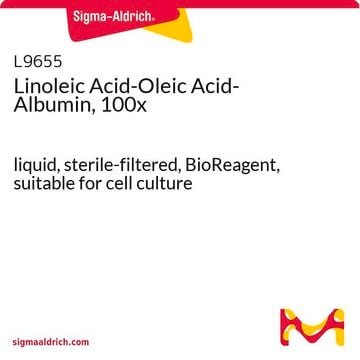O3008
Oleic Acid-Albumin from bovine serum
liquid, sterile-filtered, BioReagent, suitable for cell culture
Sinónimos:
Oleic acid-BSA complex
About This Item
Productos recomendados
esterilidad
sterile-filtered
Línea del producto
BioReagent
formulario
liquid
composición
Oleic acid, 2 mol/mol albumin
concentración
100 mg/mL BSA in DPBS
90-120 mg/mL protein (biuret)
técnicas
cell culture | mammalian: suitable
impurezas
endotoxin, tested
temp. de almacenamiento
2-8°C
Aplicación
Acciones bioquímicas o fisiológicas
Producto relacionado
Código de clase de almacenamiento
10 - Combustible liquids
Clase de riesgo para el agua (WGK)
WGK 3
Punto de inflamabilidad (°F)
Not applicable
Punto de inflamabilidad (°C)
Not applicable
Equipo de protección personal
Eyeshields, Gloves
Certificados de análisis (COA)
Busque Certificados de análisis (COA) introduciendo el número de lote del producto. Los números de lote se encuentran en la etiqueta del producto después de las palabras «Lot» o «Batch»
¿Ya tiene este producto?
Encuentre la documentación para los productos que ha comprado recientemente en la Biblioteca de documentos.
Los clientes también vieron
Artículos
Supplement cell culture systems with fatty acids for biomanufacturing heterologous proteins like monoclonal antibodies.
How the unsaturated fatty acid, oleic acid and other cell culture components affect the performance of serum-free, protein-free cell culture systems used for biomanufacturing heterologous proteins including monoclonal antibodies.
Nuestro equipo de científicos tiene experiencia en todas las áreas de investigación: Ciencias de la vida, Ciencia de los materiales, Síntesis química, Cromatografía, Analítica y muchas otras.
Póngase en contacto con el Servicio técnico







